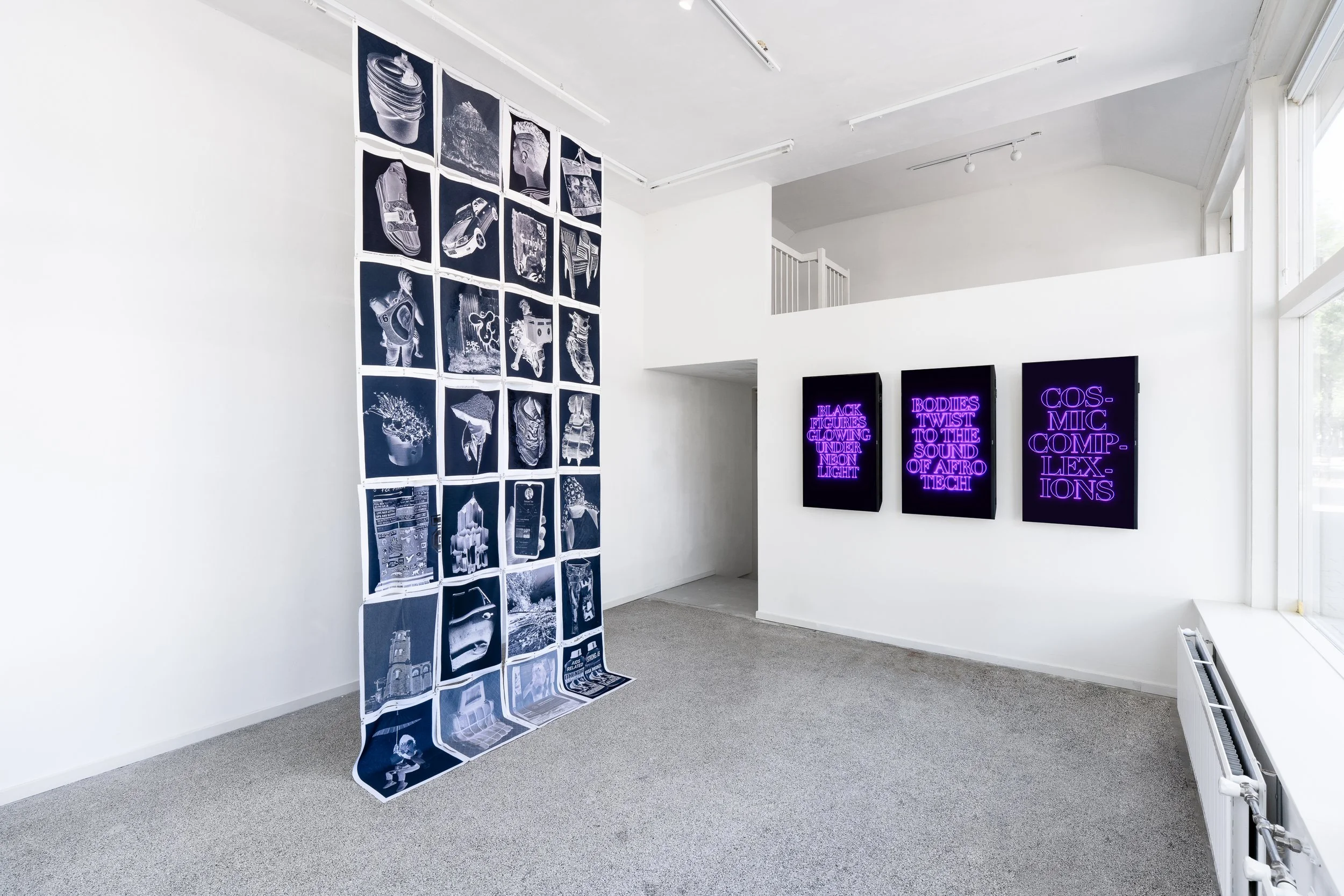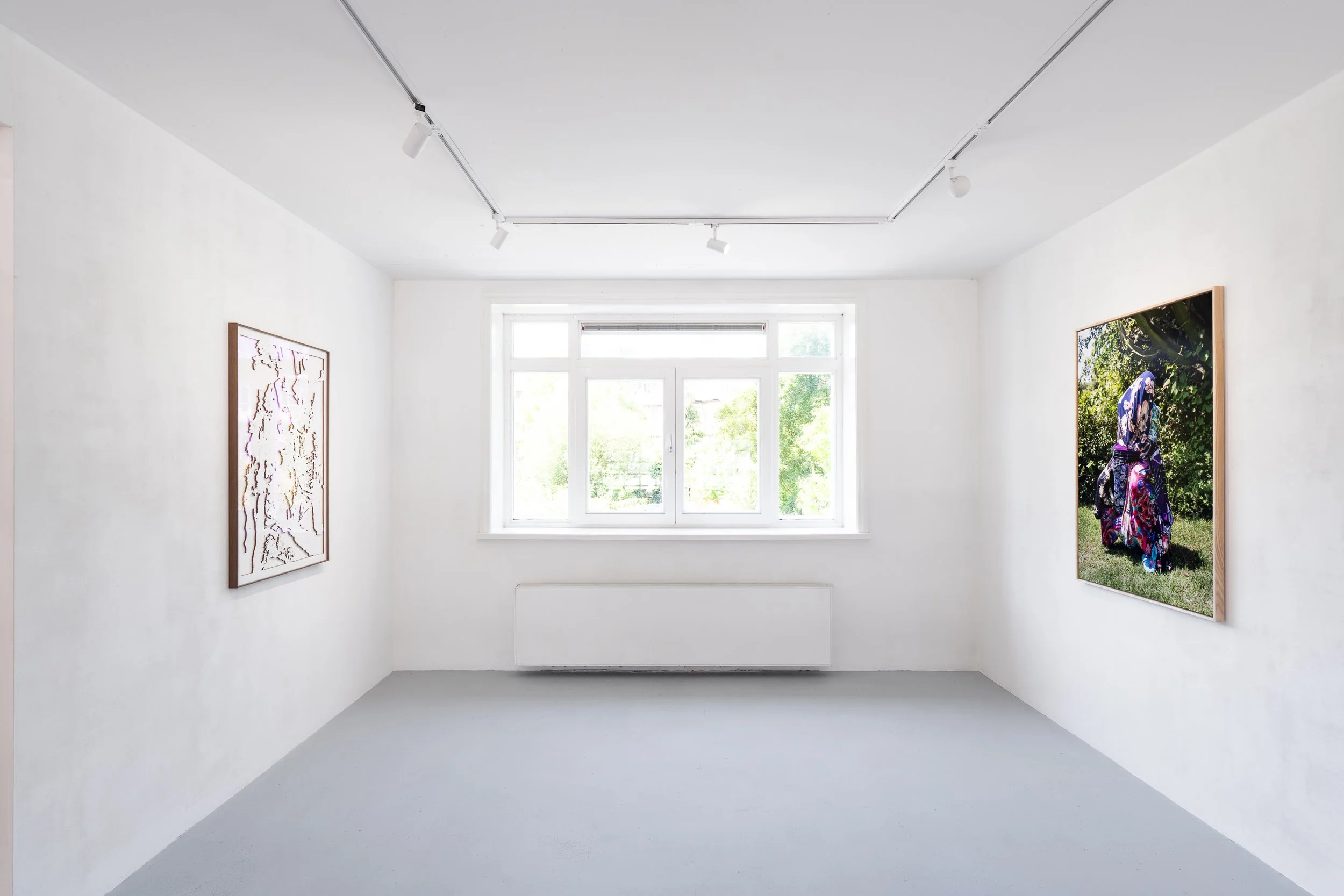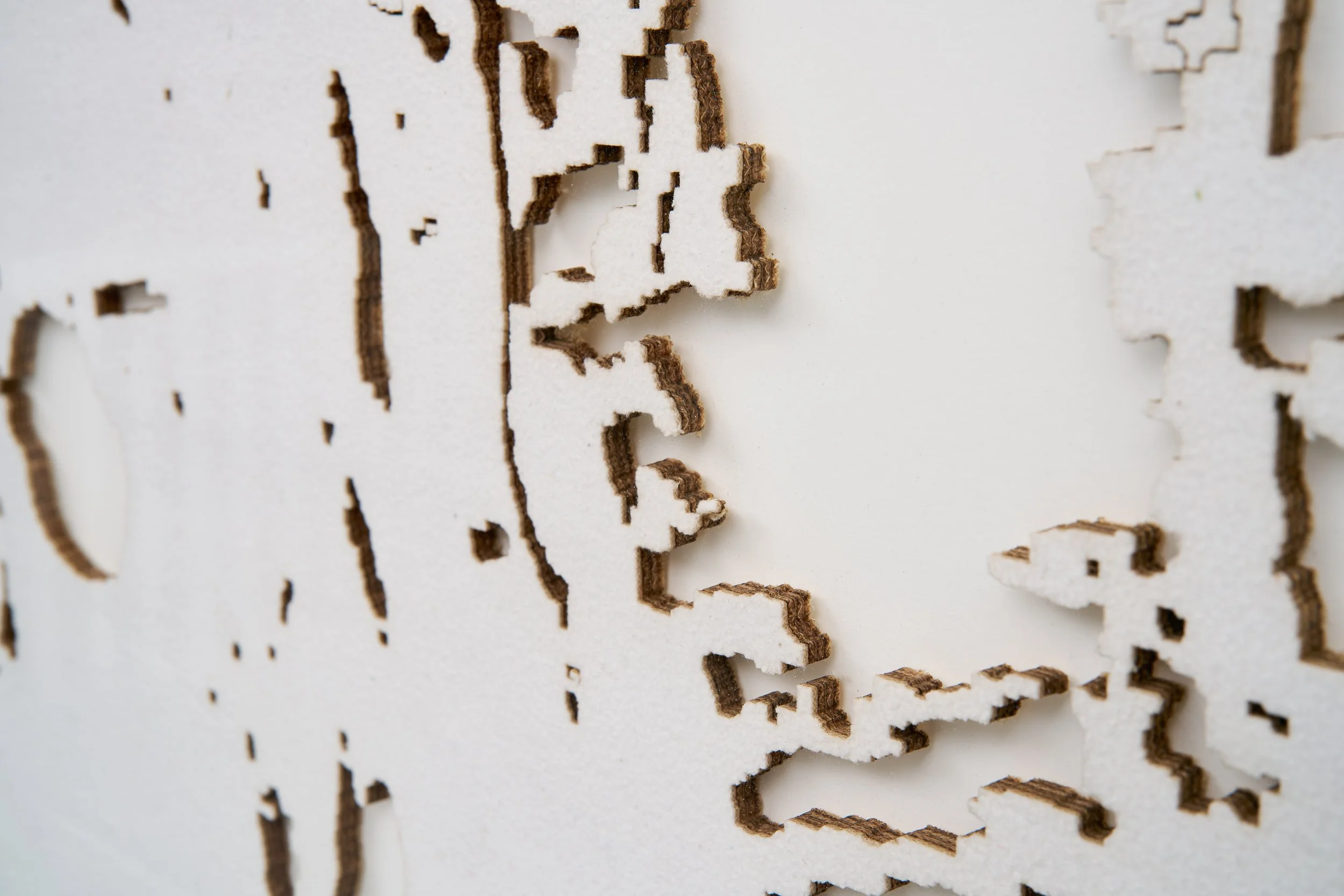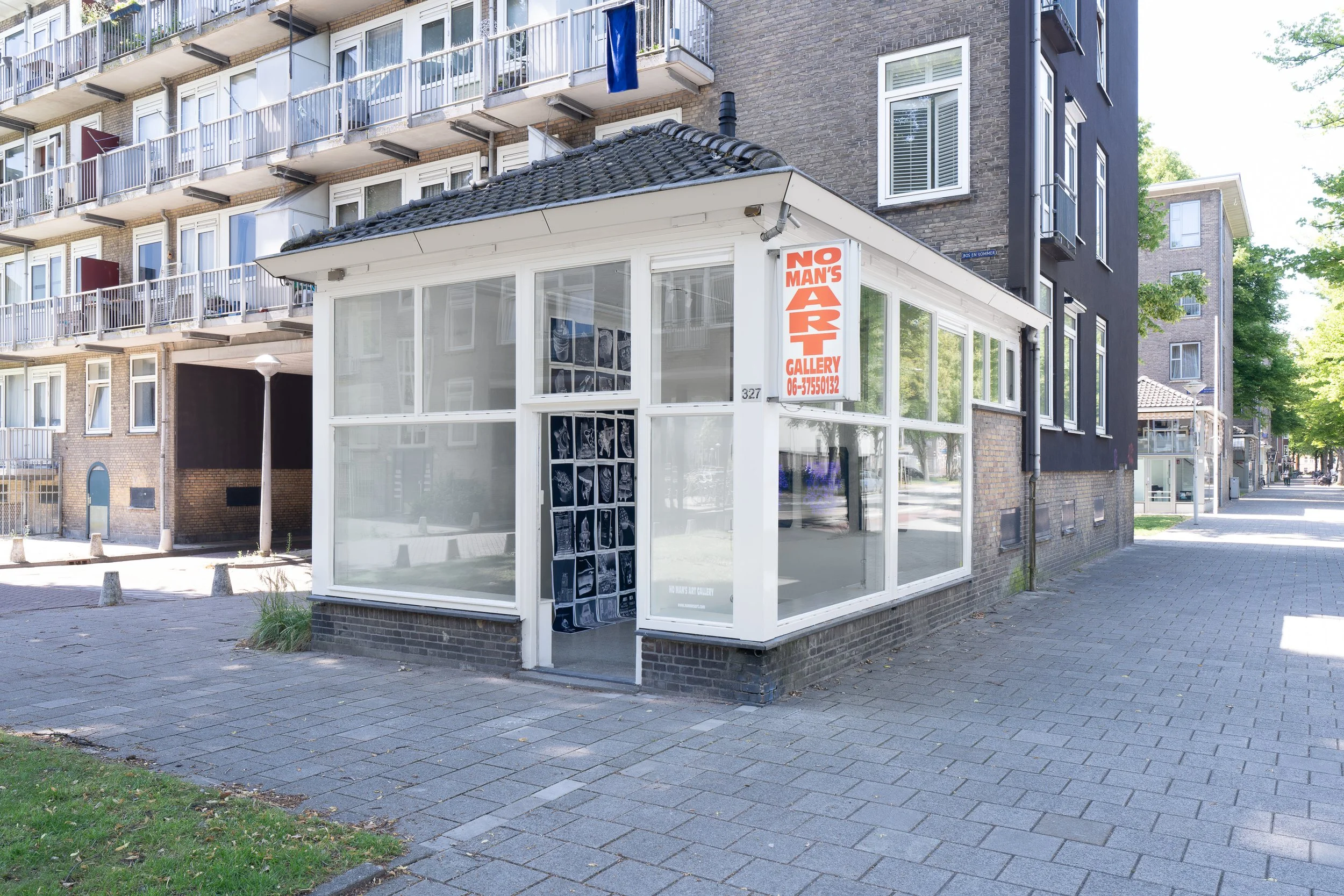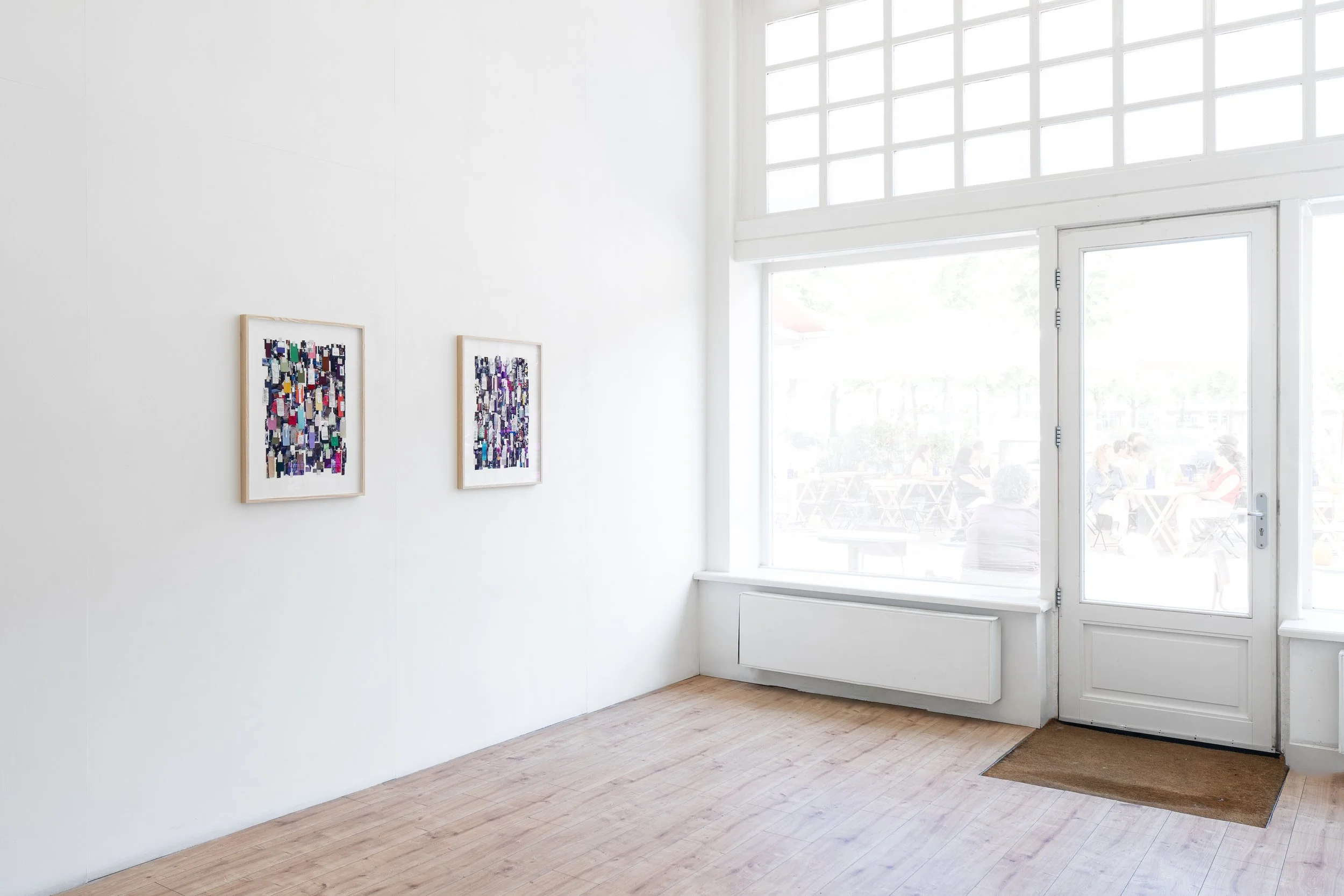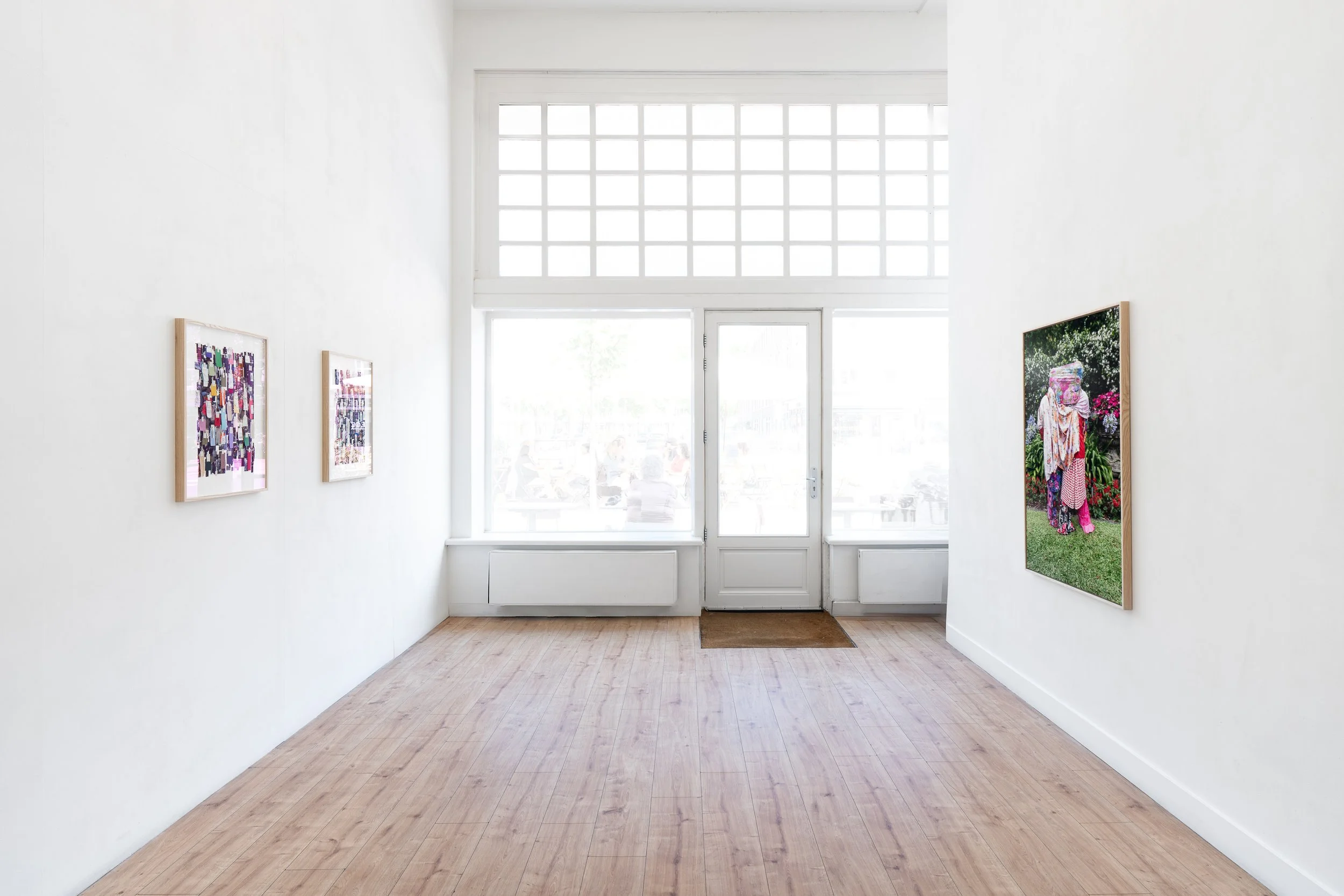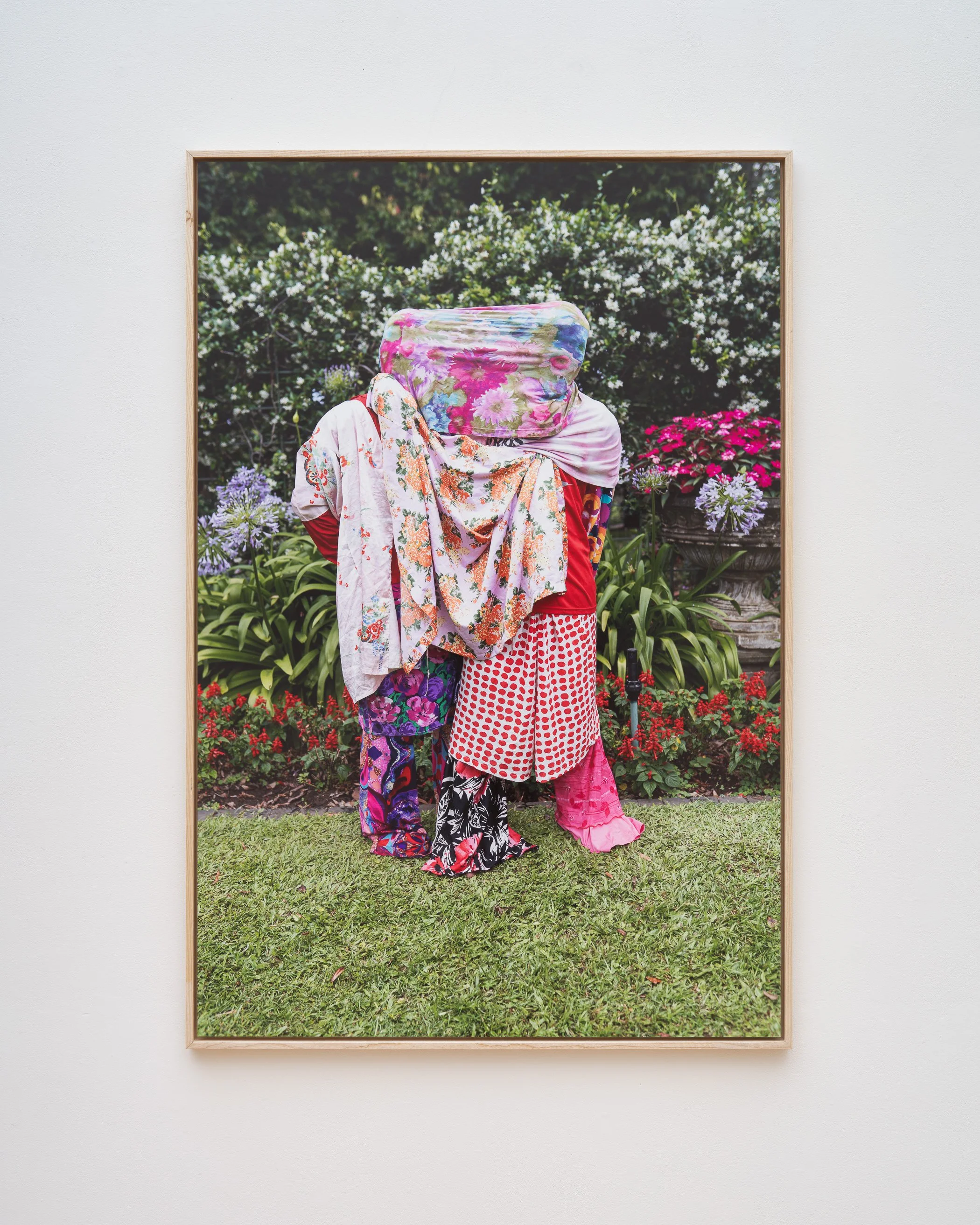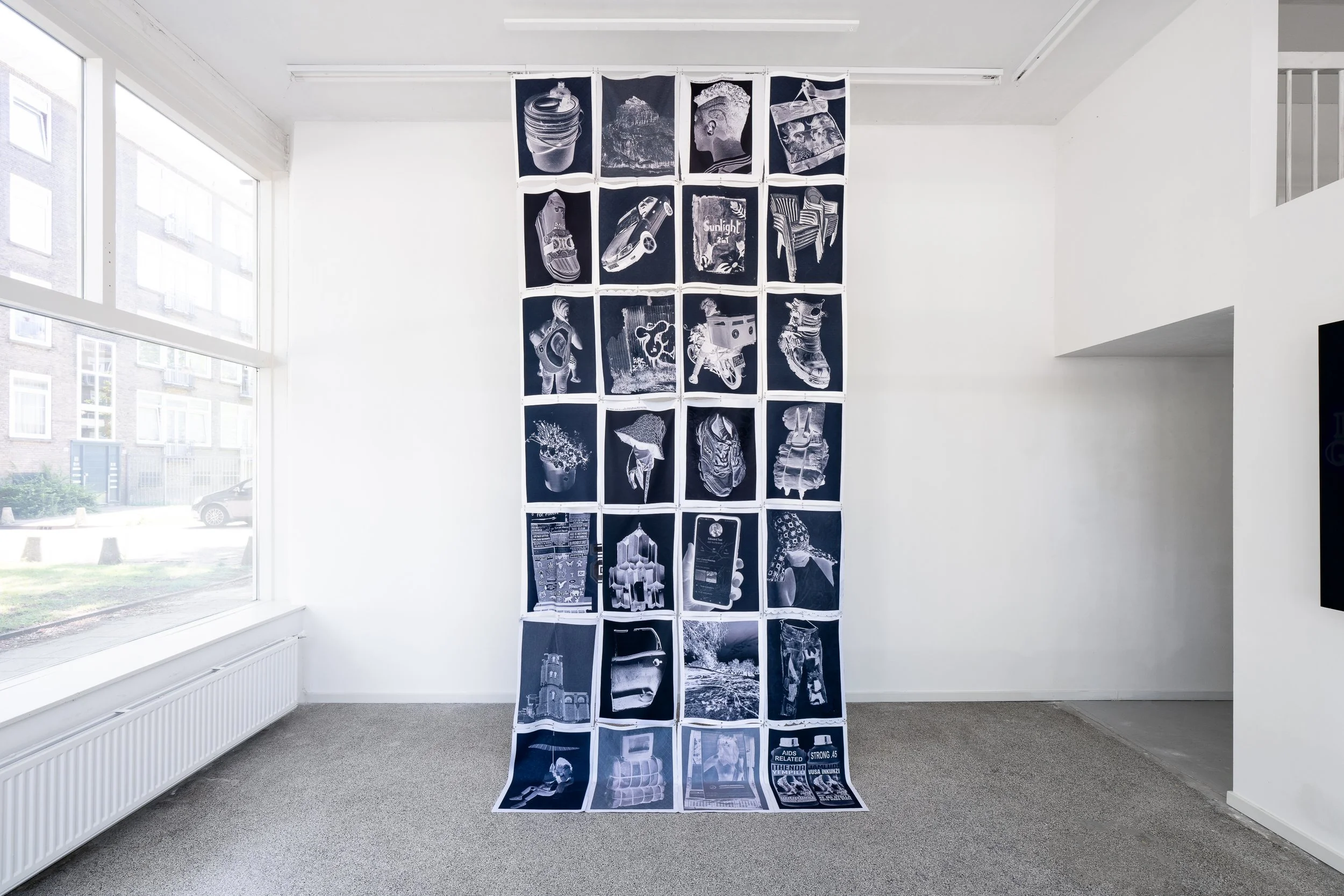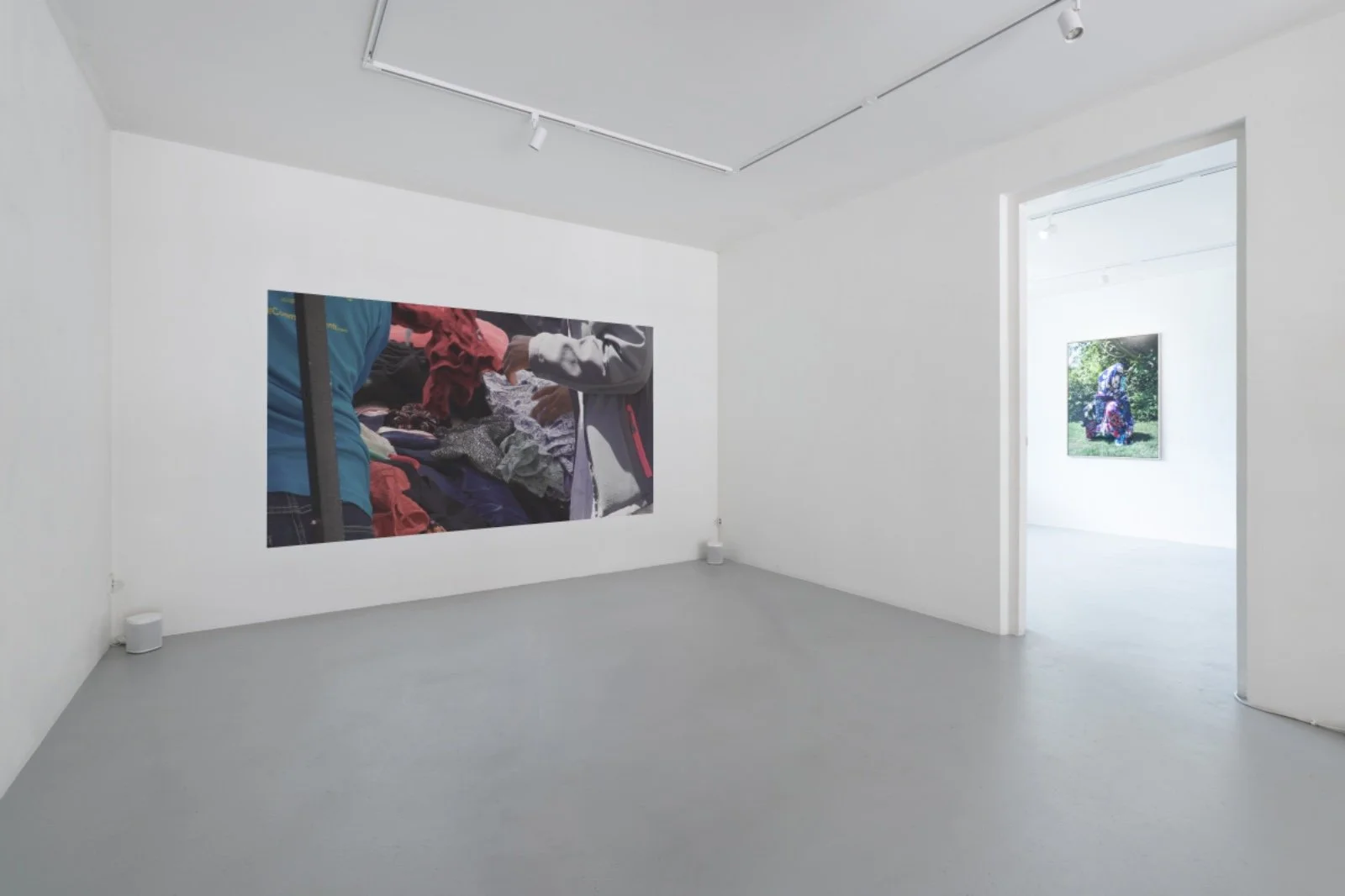Online Catalogue
19.07.2025 - 24.08.2025
Opening on Saturday, July 19th, from 5 - 8 PM
Location: NMAG, Bos en Lommerweg 88-90
NMAG KIOSK, Willem de Zwijgerlaan 327
thrifting as method
by Mpho Matsipa
Johannesburg, 2025
Jamal Nxedlana is interested in used clothing in Johannesburg. This pre-occupation has shifted and developed as his practice has expanded including his studies in Fashion Design and the role of used clothing as a vehicle of self-expression, or an article of exchange and when a cipher for narrative expression for photo shoots and other creative purposes. Johannesburg central business district (CBD) was once a booming mining town and the fulcrum of white settler colonial modernity, that now inhabits a dichotomous discursive zone between either being a bustling, elusive African metropolis[1] or a ‘ruin’ of racial capitalism, spatial violence and racialized abandonment[2]. Nxedlana, eschews these binary oppositions. He deploys his background in fashion design to explore how fashion might respond to colonial and postcolonial legacies in urban South Africa. This interest has manifested in his exploration of used clothing markets in the city through photography, moving image and textile art. The city offers a mis-end-scene for aliveness through the tropes of recycling, up cycling and their relationship to the reduction of waste, conservation of resources and savings on dumping sites.
While the work obliquely registers growing concerns over the impact of disposal of post-consumer textiles waste in Africa, and the dual environmental challenges posed by fast fashion and its related ecological toxicity, Nxedlana’s practice of thrifting re figures Johannesburg as a site of diverse cultural identities that intersect with practices, technologies and logistics that invite geopolitical inquiry with practices that combines sorting, selection, discernment and bargain hunting and decomposition with a focus on sustainability and resourcefulness and re-invention. This creative preoccupation with a tumultuous city with a long history of extractivism, offers rich grounds for speculating about how discarded personal artefacts - ‘transitory kinship structures’[3] - become vehicles that enable dreaming of a future within and against the structural failings that mark our present.
Nxedlana’s relentless exploration of thrifting as a mapping technique: sporadically visiting, geo-locating, photographing, filming and pinning locations of used clothing stores and markets that intersect with Google Earth screenshots from various angles, remembers the central business district of Johannesburg as a constellation of clothing ecosystems, narratives, bodies, and temporalities against the regimentation of dedicated inventory delivery and stocking days. In his collages, the city is reconstituted as a rhizomatic field of encounters, and repetition without serialization. An unexpected combination of textures, a disturbing stain, a tear, a loose thread or distressed fabric not only bespeaks a previous life, long since discarded and forgotten, but the base for material transformation. His process of tagging, layering and enfolding mirrors the spacetime of this part of the inner city, and how rhythms of thrifting can register improvisational, speculative and provisional quality of some of Johannesburg’s densest urban spaces.
Nxedlana’s city is far from topological. He works photographs or found visual imagery, to make collages as a way of testing the relationship between different places or different objects or just putting ideas onto a surface. Working between images taken from Google Earth, together with photographs that he has taken of the places that are specifically related to the selling of used clothing and either sellers, shoppers, or creative entrepreneurs emerge as the outcome of his research on yolo (object detection algorithm) but also on data visualisation practices, techniques in scientific research and art practice. It's a reimagining of the city as datascape, and that used clothing is encoded with data in a wider sense. The collage as a poetic tactic to register data collection in a rippling field of micro-gestures generates a speculative and poetic cartography of the city’s thrifting eco-systems. It draws you into an intimate relationship, with geopolitical and cultural questions as an act of what Tina Campt (2019) terms, ‘critical relationality’. In another series Made In Joburg he unpicks the garment labels, mining them for hidden narratives relating to the practice of used clothing: how it's shipped and ends up in South Africa. He states:
“(I’m interested in) hidden narratives or maybe not hidden narratives, but not just the narratives that are embedded in the clothing itself, so perhaps where it was made, for which company was it made, where was it sold? So, the actual material data, embedded in used clothes or factual data, but then also speculative data was something I was interested in. So, kind of thinking about the people who may have owned these clothes, the activities they would have done, the journey that the clothing has taken etc. And then as I was kind of, I guess mapping, and this is kind of like my mood board for the project and where I've put works in progress or kind of like sketches.”
Music, fashion, and experimentation are defining features of many African cities—where thrifting plays a key role in youth expression and refusal of hegemonic discourses that foreclose other possible narratives, imaginaries, practices and condition[4]. This fragmentation of micro-gestures in an over- determined, yet indeterminate space of the body, and the city, enacts both a refusal of a single point of view and an affirmation of multiplicity and undecidability of African urban sub-culture. Nxedlana’s scalar shifts and recalibrations are themselves quiet acts of refusal, that simultaneously assert the possibility of world-building in the face of negations, that renders us and our environment unintelligible and disposable.[5] However, his study of stains also offer a re mapping of geopolitical intimacies, a temporal suspension of spatial hierarchies that opens up questions about the foundations of everything, from the machinations of late state capitalism, to the way bodies, and identities, might mingle, touch each other, and leave traces that could lead to material and affective transformations – albeit in radically asymmetrical ways[6].
Nxedlana’s thrifting-as-method serves as a capacious and generative re-imagining of everyday practices that fundamentally scramble stable identities as well as what it means to refuse the terms given to us. In their most utopian light these textile time capsules might be vessels for world-building and coded information exchange[7]. Although they are coeval with uni-directional toxic infrastructures of global trade and disposal, they nevertheless give rise to experimentation and sub-cultures in music and fashion that are the hallmark of dynamic cities in Africa, and the ambivalence and violence of geopolitical intimacies.[8] In this body of work, Nxedlana offers a momentary reprieve: a tactile, sensory engagement with these textiles in a universe of reciprocal exchanges that are familiar, playful, intimate and strange - perhaps a clearing for meaning-making through a sensorial and philosophical response to complex global systems.
References:
[1] Nuttall, Sarah, and Achille Mbembe, eds. Johannesburg: the elusive metropolis. Duke University Press, 2020.
[2] Simone, AbdouMaliq. "People as infrastructure: Intersecting fragments in Johannesburg." Public culture 16.3 (2004): 407-429.
[3] Brown, DeForrest. Assembling a Black Counterculture. New York: Primary Information, 2022. And Wark, McKenzie. Raving. Duke University Press, 2023.
[4] Zililo, Marion, “Interview with thulile Gamedze” in La belle Revue (2018) https://labellerevue.org/en/global terroir/le- cap/entretien-avec-thulile-gamedze
[5] Campt, Tina Marie. "Black visuality and the practice of refusal." Women & Performance: a journal of feminist theory 29.1 (2019): 79-87.
[6] Stoler, Ann Laura, ed. Haunted by empire: Geographies of intimacy in North American history. Duke University Press, 2006. And Pain, R., & Staeheli, L. (2014). Introduction: Intimacy-geopolitics and violence on JSTOR. Area, 344. https://doi.org/24811736
[7] Malatsie, Kabelo, and Lantian Xie, eds. Matter Mattering Matters: A Scienticity Reader. Mousse Publishing, 2025.
[8] Desmond, Vincent, Photos: A Look Inside Nigeria's Alté Subculture, OkayAfrica, https://www.okayafrica.com/nigeria-alte- subculture-inside-photos-look/ also see Jade, Diana, 6 reasons thrift clothing is popular among younger Nairobians (2025) https://www.pulselive.co.ke/articles/lifestyle/fashion/reasons-thrift-clothing-is-popular-among-kenyan- youths-2025061914011052850
Installation views of Data Tapestries, solo exhibition by Jamal Nxedlana, No Man’s Art Gallery, Amsterdam, 2025. All images by Jonathan de Waart
Jamal Nxedlana (b. 1985, SA) is an artist and cultural worker. His practice begins with fashion and subculture as domains of intellectual and cultural inquiry, from which to respond to colonial and apartheid legacies in urban South Africa. He has exhibited internationally in galleries, institutions, and independent spaces.
Recent exhibitions include SPECTRUM (2023), his second solo exhibition at No Man’s Art Gallery in Amsterdam; The New Black Vanguard (2022) curated by Antwaun Sargent at Saatchi Gallery in London; and Orlando (2022) curated by Tilda Swinton at the Fotomuseum Winterthur, Switzerland.
As a cultural worker, Nxedlana founded Bubblegum Club, a digital platform and culture agency showcasing innovative new work and creating opportunities for emerging creatives. He is also a founding member of CUSS Group, a Johannesburg based art collective that has exhibited in major institutions including Kunsthall Trondheim Norway, Moderna Museet Stockholm, de Young Museum and the Berlin Biennale.
His current project, Data Tapestries, maps social, cultural and economic activity related to used-clothing from Western countries in African cities, while exploring themes such as memory, data and innovation.
